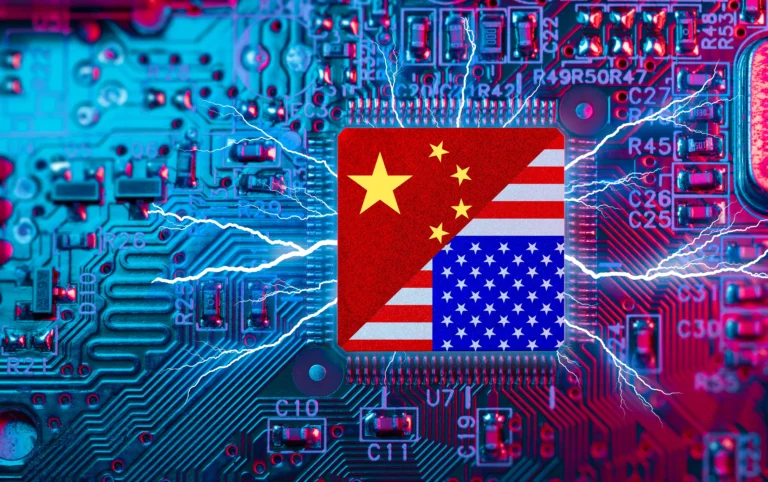Hardy Airtificial Intelligence
Hardy News provides in-depth coverage of the latest trends in technology and innovation, focusing on advancements in Artificial Intelligence, machine learning breakthroughs, practical applications, and discussions on ethics in the digital era.

Our Top Picks
포옹하는 얼굴은 테스트 시간 조정이 작은 언어 모델이 자신의 무게를 초과하는 데 어떻게 도움이 되는지 보여줍니다.
steve smith 11 months ago
In recent years, language models have become a cornerstone of artificial intelligence, powering a wide range of applications, from chatbots...
Google Chrome은 AI를 사용하여 새로운 사기 감지 기능으로 페이지를 분석합니다.
steve smith 11 months ago
‘AI 올림픽’ NeurIPS, 미-중 기술 경쟁 속에서 캐나다에서 새로운 장애물에 직면
화웨이 인공지능(AI) 프로세서에서 칩이 발견된 중국 기업이 미국으로부터 처벌을 받게 됐다.
OpenAI, 새로운 O3 모델 발표: AI 기술의 도약
Latest Guide
화웨이 인공지능(AI) 프로세서에서 칩이 발견된 중국 기업이 미국으로부터 처벌을 받게 됐다.
In a significant development in the ongoing global tech and trade tensions, a Chinese semiconductor firm whose chip was discovered in Huawei’s advanced AI processor is now facing imminent punitive actions by the United States. This latest move underscores the intensifying rivalry between the two nations in the realms of technology, national security, and intellectual property. The chip in question, which was found in Huawei’s AI processor, has triggered a series of escalating events, with the U.S. government targeting the Chinese firm for allegedly violating international trade sanctions and technology export restrictions. The decision highlights the ongoing pressure the U.S. is exerting on Chinese tech companies, particularly those linked to Huawei, as part of a broader strategy to curb China’s growing influence in global technology markets. Background of the Situation The Chinese semiconductor company, which remains unnamed at this point, is accused of providing a key component that was integrated into Huawei’s AI processors used in the company’s 5G networks, smartphones, and artificial intelligence (AI) systems. These chips were found to be critical in powering some of Huawei’s most advanced hardware, further strengthening the company’s ability to compete on the global stage. The discovery of the chip sparked an investigation by U.S. authorities, who have been wary of Huawei’s expansion due to national security concerns. Washington has long accused Huawei of being a potential security threat, alleging that the company’s technology could be used by the Chinese government for espionage—a claim that Huawei has consistently denied. As a result, sanctions and trade restrictions have been placed on Huawei, limiting its access to critical technology, including semiconductors from U.S. firms. What This Means for the Chinese Firm The firm in question, which is believed to be a key supplier of chips for Huawei, is now facing serious repercussions. According to sources, the U.S. government is planning to impose trade sanctions on the company, further limiting its access to U.S. technology, which could severely hamper its operations. The sanctions could include restrictions on purchasing critical equipment, as well as limitations on the firm’s ability to conduct business with American companies. This punishment is part of a broader U.S. effort to isolate Chinese companies from access to advanced technology that is deemed to be sensitive or potentially harmful to U.S. national interests. This move also aims to prevent Chinese firms from gaining access to cutting-edge technologies in semiconductors, AI, and telecommunications that could fuel China’s technological advancements and contribute to its rise as a global tech leader. The Role of Huawei in the Tensions Huawei, the world’s largest telecommunications equipment manufacturer, has long been at the center of a global battle over technology, national security, and economic dominance. The company has been subject to severe sanctions by the U.S. government, which has restricted Huawei’s access to crucial technologies such as Google’s Android operating system, high-performance semiconductors, and key network equipment. Huawei has repeatedly denied the allegations of espionage, maintaining that its business is independent of the Chinese government. Despite the sanctions, Huawei has continued to innovate and advance in areas such as 5G technology, AI, and cloud computing. However, the sanctions have made it increasingly difficult for the company to source the critical components it needs, particularly in the field of semiconductors. In response to the U.S. sanctions, Huawei has sought to develop its own supply chain for essential components, including AI chips. The discovery of the Chinese firm’s chip in Huawei’s AI processor highlights the ongoing efforts by the company to secure alternatives to U.S. suppliers. However, these efforts have now drawn the attention of U.S. authorities, putting additional pressure on Huawei and its partners. The U.S. Strategy to Curb China’s Technological Advancement The U.S. government’s decision to target this Chinese semiconductor firm is part of its broader strategy to limit China’s technological rise. By restricting access to advanced technologies such as semiconductors and AI, the U.S. aims to stifle China’s ambitions in becoming a leader in these cutting-edge fields. The sanctions imposed on Huawei, as well as on companies like the Chinese chip manufacturer, are part of a larger campaign to protect U.S. intellectual property and maintain its technological edge over China. The U.S. sees technological supremacy as a key element of global power. Semiconductors, which are essential for everything from smartphones and computers to military systems and AI, are a critical part of this equation. The U.S. has invested heavily in its own semiconductor industry and has placed great importance on maintaining control over the most advanced chip technologies. As China moves closer to self-sufficiency in this area, the U.S. is working to prevent any breakthroughs that could challenge its position. Impact on the Global Tech Industry The latest punishment could have significant implications for the global tech ecosystem. Semiconductor manufacturers around the world are closely monitoring these developments, as they could affect supply chains and the availability of critical components. The U.S. sanctions could lead to further disruption in the global supply of chips, as companies look to diversify their suppliers and reduce reliance on Chinese firms. Moreover, the ongoing U.S.-China trade tensions are likely to spur more countries to re-evaluate their own relationships with Chinese tech companies. As many nations are caught in the middle of this geopolitical struggle, the tech industry is facing a period of uncertainty and realignment. Companies with ties to both the U.S. and China may be forced to make difficult decisions about where to source their technology and how to comply with increasingly complex regulations. Looking Ahead: The Future of U.S.-China Relations in Tech The punishment of the Chinese semiconductor firm is just the latest chapter in the U.S.-China tech war, a conflict that shows no signs of abating. As both countries continue to battle for supremacy in the AI, semiconductor, and 5G industries, the global tech landscape is poised for significant shifts. For the Chinese firm in question, the punishment could prove to be a major blow, impacting its ability to compete on the global stage. However, it could also spur
Latest Posts
Gemini 3 Is Here—and Google Says It Will Make Search Smarter
Gemini 3 is skilled at reasoning, generating video, and writing code. Amid talk of an AI bubble, Google notes the new model could help increase search revenue too.
Published: 3 hours ago
Microsoft’s Agent 365 Tries to Be the AI Bot Boss
Microsoft still sees AI agents as the future of work, and the enterprise software giant wants companies to be able to manage those agents just like human employees.
Published: 3 hours ago
‘Odd Lots’ Cohost Joe Weisenthal Has Predictions About How the AI Bubble Will Burst
Much of the US economy rests on AI’s future. On this episode of The Big Interview podcast, Odd Lots cohost Joe Weisenthal breaks down why AI’s impact on finance goes beyond billion-dollar investments.
Published: 8 hours ago
The 4 Things You Need for a Tech Bubble
On this episode of Uncanny Valley, guest Brian Merchant walks us through a historical framework he used to analyze whether AI fits the classic signs of an economic bubble—and what that means for all of us.
Published: 21 hours ago
OpenAI's Fidji Simo Plans to Make ChatGPT Way More Useful—and Have You Pay For It
As OpenAI expands in every direction, the new CEO of Applications is on a mission to make ChatGPT indispensable and lucrative.
Published: 1 day ago
Use Google Gemini and ChatGPT to Organize Your Life With Scheduled Actions
The AI’s latest trick is following the schedule you set for it.
Published: 2 days ago
How to Use the New AI Features in OmniFocus, the Power User’s To-Do List
One of the Mac’s most popular productivity apps is incorporating generative artificial intelligence in a way that keeps it offline, private, and customizable.
Published: 3 days ago
The Data Center Resistance Has Arrived
A new report finds that local opposition to data centers skyrocketed in the second quarter of this year.
Published: 4 days ago
You Won’t Be Able to Offload Your Holiday Shopping to AI Agents Anytime Soon
Chatbot developers and retail giants are battling over user data as they lay the foundation for a future in which AI agents can do all your online shopping for you.
Published: 4 days ago
AI Relationships Are on the Rise. A Divorce Boom Could Be Next
Secret chatbot flings are creating new legal challenges for married couples when it comes to infidelity.
Published: 5 days ago


























